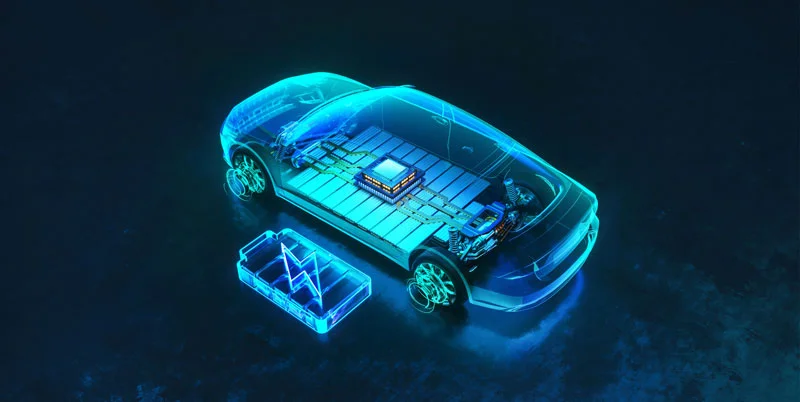
02-Oct-2024
The Future of Battery Technology in the Electric Vehicle Charging Station (EVCS) Sector
Introduction
As the electric vehicle (EV) market continues to grow, so does the importance of battery technology in the Electric Vehicle Charging Station (EVCS) sector. Battery advancements play a critical role in determining the efficiency, range, and overall user experience of electric vehicles. This blog post will delve into the various aspects of battery technology impacting the EVCS sector, exploring innovations, challenges, and future trends.
Understanding Battery Technology
1. Types of Batteries Used in EVs
The two most common types of batteries used in electric vehicles are Lithium-ion (Li-ion) and solid-state batteries.
Lithium-ion Batteries: Currently the most widely used battery technology in EVs, Li-ion batteries offer high energy density, longer life cycles, and relatively low self-discharge rates. However, they are sensitive to temperature fluctuations and can degrade over time.
Solid-State Batteries: This emerging technology utilizes a solid electrolyte instead of a liquid one, providing higher energy density and enhanced safety. While still in development, solid-state batteries promise faster charging times and longer lifespans.
2. Innovations in Battery Technology
Battery technology is rapidly evolving, with numerous innovations that could reshape the EVCS landscape:
Fast Charging: Researchers are working on enhancing fast-charging capabilities, reducing the time it takes to recharge batteries significantly. New materials and designs are being tested to facilitate quicker ion movement, allowing for charging times comparable to traditional gasoline refueling.
Battery Management Systems (BMS): Advanced BMS technology optimizes battery performance by monitoring and managing the health and efficiency of batteries. This ensures longer lifespans and maximizes the range of EVs, enhancing the overall user experience.
Recycling and Second-Life Applications: As EV adoption increases, so does the need for sustainable practices in battery disposal. Innovations in recycling technology are crucial for reclaiming valuable materials, while second-life applications, such as using used EV batteries for energy storage in homes and businesses, are gaining traction.
3. Challenges Facing Battery Technology
While advancements are promising, several challenges remain:
Cost: The high cost of battery production remains a significant barrier to widespread EV adoption. Researchers are exploring ways to reduce costs through alternative materials and manufacturing processes.
Range Anxiety: Despite improvements in battery technology, consumers still express concerns about range and charging infrastructure. Enhancing battery energy density can help mitigate these fears by allowing for longer driving ranges on a single charge.
Environmental Impact: The extraction and processing of materials used in batteries can have detrimental effects on the environment. Developing sustainable mining practices and recycling methods is crucial to reducing the carbon footprint of battery production.
The Role of EV Charging Stations
As battery technology continues to improve, the EV charging infrastructure must evolve in tandem. Charging stations will need to support fast charging and offer compatibility with various battery technologies. The integration of smart charging solutions, which optimize charging times based on grid demand and energy costs, will further enhance the user experience.
Future Trends
Looking ahead, several trends are expected to shape the battery technology landscape in the EVCS sector:
Increased Adoption of Solid-State Batteries: As research progresses, solid-state batteries may become more commercially viable, offering safer and more efficient energy storage solutions.
Decentralized Energy Systems: The rise of microgrids and decentralized energy systems will enable more efficient use of energy, allowing for better integration of renewable energy sources with EV charging infrastructure.
Vehicle-to-Grid (V2G) Technology: This innovative technology allows EVs to feed energy back into the grid, helping to balance demand and supply. As battery technology improves, V2G systems could become a standard feature in the EVCS ecosystem.
Conclusion
Battery technology is at the heart of the EVCS sector, driving advancements in efficiency, safety, and user experience. As we move towards a more sustainable future, ongoing innovations in battery technology will be crucial in addressing the challenges and opportunities within the electric vehicle landscape. By fostering collaboration between manufacturers, researchers, and policymakers, we can unlock the full potential of battery technology, paving the way for a cleaner, greener world.
Incentives and Rebates on EV charging Station in India?

In India, the government and various state authorities are promoting the adoption of electric vehicles (EVs) and the installation of EV charging infrastructure through various ince...
6 min ago

How to Start an EV charging station business in India?

An EV charging station business in India involves setting up infrastructure to facilitate the charging of electric vehicles (EVs). These stations can vary from simple charging poin...
6 min ago

Pioneering Sustainable Manufacturing: Ecoplug Energy India Limited's Global Impact

Introduction:
Embark on a journey with Ecoplug Energy India Limited, a trailblazer in sustainable manufacturing, as we transcend boundaries and redefine industry standards. From o...
6 min ago

Everything You Should Know About EV Charging Stations Setup Process

India has emerged as the third-largest market for Electric Vehicles (EVs) globally. The government is actively promoting the adoption of EVs through various initiatives. To further...
6 min ago

Powering Tomorrow: EVCS Commercial Solutions by EcoPlug Energy India Limited

Introduction:
Welcome to the future of sustainable transportation with EcoPlug Energy India Limited. In an era where environmental consciousness is paramount, businesses are seeki...
6 min ago

Copyright © 2024 ECOPLUG ENERGY INDIA LIMITED, All Rights Reserved.